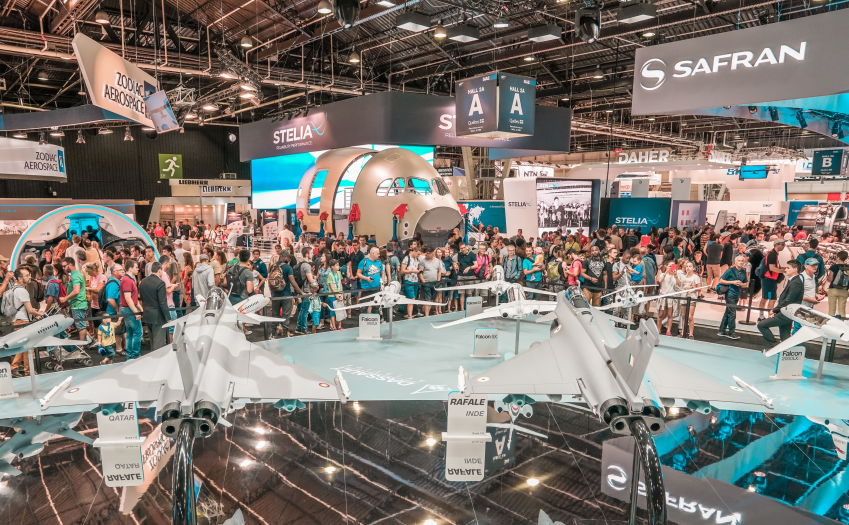
Paris Air Show: for a European space strategy
The 55th International Paris Air Show, held at Le Bourget, near Paris, from June 16 to 22, 2025, was the scene of a number of announcements of essentially European scope. The Centre National d'Etudes Spatiales (CNES) highlighted the cooperation between the German and French space agencies, the first mission of a French astronaut, the announcement of the winners of the SpaceFounders European startup gas pedal, and the decarbonization roadmap for the French space industry. All these announcements were welcomed by the President of the French Republic, who underlined the importance for France and Europe of innovating and developing their sovereign capabilities in the space sector, during his visit to the show.
The Paris Air Show (SIAE) is one of the world's leading events for the aerospace industry. Born at the very beginning of the 20th century, this year's SIAE welcomed over 305,000 visitors, and benefited from a strong influx of industry professionals, who gathered to see the latest innovations in aeronautics and space.
The Centre national d'études spatiales (CNES), which had a strong presence on site, made space a major theme this year, organizing the Paris Space Hub, a hall entirely devoted to space that brought together the main players in the French and European space sectors, next to giant models of Ariane 1 and Ariane 5.
For a French and European space strategy
Most of the projects presented at the show have a European dimension. It was this aspect that the President of the French Republic emphasized in his speech at the Paris Air Show. Referring to "an international context full of threats", the President stressed the importance for France and Europe of innovating and developing their "sovereign capabilities in the space sector".
According to CNES, which reported the remarks, Emmanuel Macron "urged Europe to lead a 'forced reconquest' in the space sector, against a backdrop of growing competition from American and Chinese giants, and heavy dependence on SpaceX constellations". He also called for "the European Union to give itself the means to become a space power ".
This European commitment was also underlined by the President during his videoconference with French astronaut Sophie Adenot, currently training with NASA in the USA. The French astronaut's first mission aboard the International Space Station, scheduled for spring 2026, now has a name: εpsilon.
The name of the mission and "its patch" were announced at the Paris Air Show. During this mission, Sophie Adenot will carry out "numerous scientific, technological and educational experiments" on board the ISS, supported by CNES and the French space community, "contributing to scientific research and inspiring younger generations".
Europe, the driving force behind our projects
In addition to its presence at the show, CNES also took part in a number of special events, which gave rise to various announcements. These included:
- The strengthening of German and French space agencies, notably in the implementation of several joint projects in the field of "critical and disruptive technologies, at the service of European space sovereignty". Germany, which was CNES's guest of honor at the Paris Air Show, affirmed its willingness to move forward on these major space projects. Indeed, the two countries are Europe's two leading partners in the space sector. Three new missions have been announced: a Japanese exploration mission that will take off for the moons of Mars in 2026, with a new small rover, Idefix, that will play the role of scout; an Earth observation mission, Merlin, that will look at "atmospheric methane concentration" and is scheduled for launch in 2028. Finally, a "reusable launcher" demonstrator, the Callisto project, whose first test flight is scheduled for 2026;
- A project for a reusable European high-thrust engine. This program, known as ASTRE, is set to "propel European rockets to the stars". The aim of this ambitious initiative is to "revolutionize European space propulsion to meet the future needs of heavy launch and space exploration missions". This new engine will provide the French and European space industry with new skills for strategic applications.
Startups supported at French and European level
Another European project, the SpaceFounders European startup gas pedal, unveiled its winners at the Paris Air Show. According to CNES, SpaceFounders is a "European acceleration program for space startups, open to the best entrepreneurs in Europe (including England and Switzerland)".
In the European space ecosystem, the announcement of the winners of this 6th promotion was eagerly awaited: the selection includes 15 startups, four of them French, who will be supported in their growth. Coaching will take place from September to December, both face-to-face and virtual, in three European cities specialized in space: Toulouse, Munich and Turin.
The selected winners are all developing innovative technologies for uses as varied as "space surveillance, earthquake forecasting or the manufacture of pharmaceuticals in space". On the agenda for the 15 selected startups: structuring company growth, financing strategies, industrial visits and business meetings in Europe thanks to SpaceFounders partners.
Winners will also benefit from access to an alumni network linking 70 of Europe's top space companies, to share experience, build business relationships and exchange ideas with "experienced mentors from the world of investment and the space industry".
Since its creation, CNES points out, SpaceFounders "has supported 70 companies, 28 of which are French or have a subsidiary in France", and raised €297 million in funding, including €100 million for French companies.
Decarbonizing the space industry
The decarbonization roadmap for the French space industry, a world first, was also announced at the Paris Air Show. As early as 2023, the Ministry of the Economy had asked CNES to lead the development of a common roadmap for the entire French space industry, with the aim of " measuring the environmental impact of the sector on a national scale and committing to reducing this footprint".
As no rigorous assessment of the space industry's carbon footprint has been carried out to date, this project is a world first, the fruit of "voluntary and constructive collaboration between industry players, based on the current state of available knowledge".
This initiative, adds CNES, is in line with international standards and "marks the start of a structured approach to reducing the carbon footprint of the industrial sector". The ambition is to achieve significant targets by 2040, with a long-term vision for 2050, "perfectly in line with France's and the European Union's commitments, as well as with the national low-carbon strategy".
In concrete terms, 12 action levers have been defined, grouped into five themes (energy, transport, materials, processes, data), each structured around a "list of actions to be implemented by the ecosystem, as well as the conditions for success required to achieve them".







No comment
Log in to post comment. Log in.